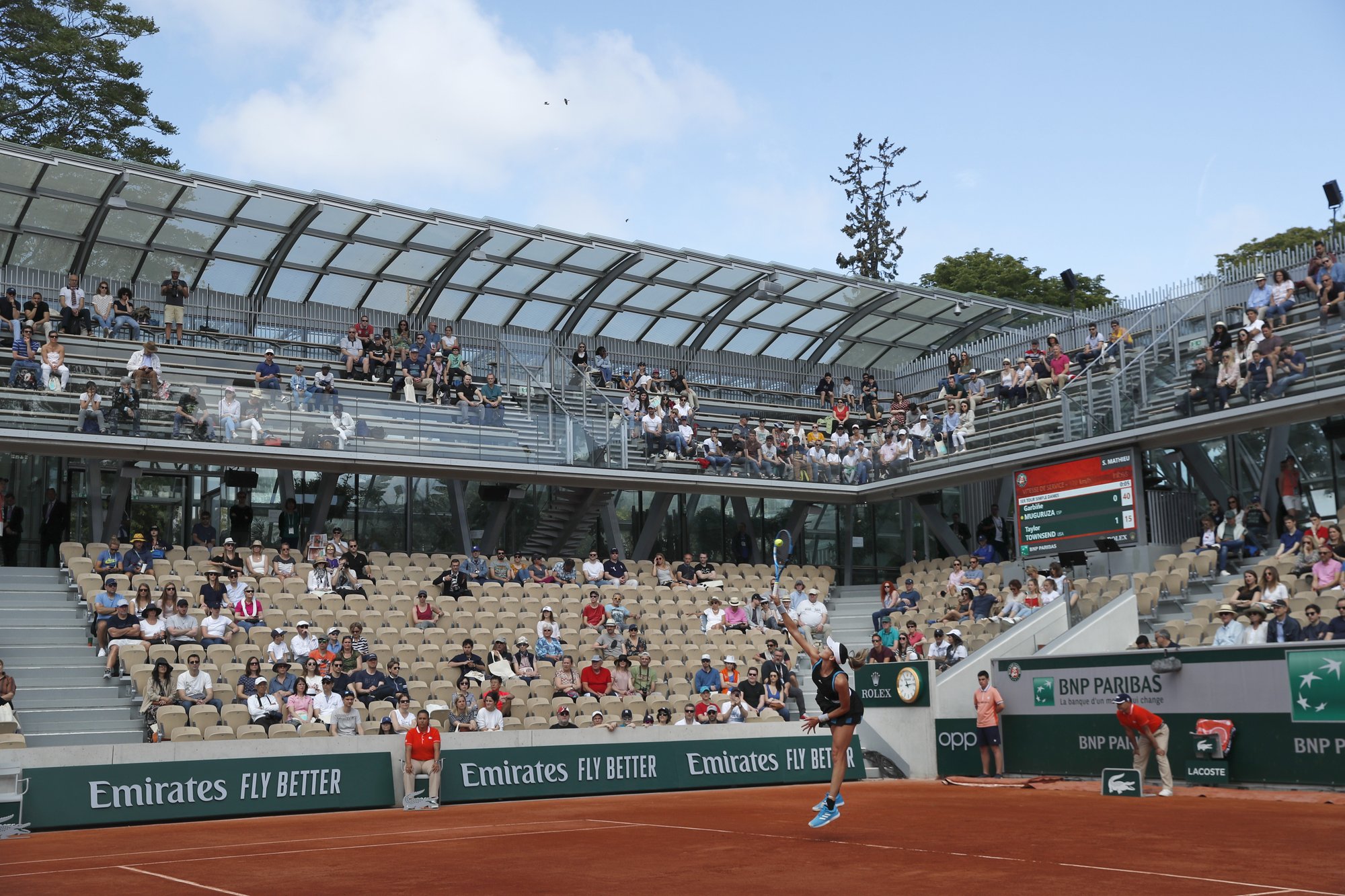Tennis and tropical plants: New French Open court is wild

The new Simonne Mathieu court is seen as Spain’s Garbine Muguruza serves against Taylor Townsend of the U.S. during their first round matches of the French Open tennis tournament at the Roland Garros stadium in Paris, Sunday, May 26, 2019. (AP Photo/Pavel Golovkin)
PARIS — Tennis and tropical plants: The stunning new court at the French Open is, quite literally, wild.
Surrounded on all four sides by greenhouses filed with exotic plants, the Court Simonne Mathieu saw its first French Open match on Sunday, a triumph for tournament organizers who overcame strong opposition from critics who long sought to block construction in a 19th-century garden of the 5,290-seat arena.
Automatic sprinklers periodically doused the lush greenery from Africa, Asia, South America and Australia as Garbine Muguruza, too busy to notice, beat Taylor Townsend of the United States 5-7, 6-2, 6-2.
Muguruza, the 2016 champion, later gave a big thumbs-up to the sunken arena that is now the third-biggest at Roland Garros, after the 9,829-seat Court Suzanne Lenglen and the 14,962-seat showcase Court Philippe Chatrier that is in the process of being rebuilt.
“It’s a very cute court. It’s not small, but it’s, you know, cozy,” Muguruza said. “It’s like in a garden. It’s a different feeling.”
Spectators were impressed, too.
“It’s like being in a forest,” said Parisian Kelly Orsinet. “It’s relaxing and pleasant.”
Sinking the red clay court and surrounding it with tasteful modern hothouses filled with leafy plants prevented it from being an eyesore in its historic surrounds, the Auteuil gardens that date back to 1898 and are loved for their majestic steel and glass greenhouses for prized botanical collections.
Expanding into the gardens is part of a massive, partially completed 380-million euro ($425 million) revamp of Roland Garros, the smallest of tennis’ Grand Slam venues that can feel uncomfortably cramped in its busiest opening week.
Gilles Jourdan, the project manager overseeing the modernization, was on hand to savor the new arena’s atmosphere with its first crowd, a landmark in what has been a difficult birth, complicated by legal challenges from opponents.
Neighbors who overlook the site had “said ’It’s a disgrace! A disgrace!” Jourdan recalled. “Fewer and fewer are saying it’s a disgrace now.”
“You can’t see the court. That’s very important and that was the most fundamental idea,” he said. “If you’re not flying overhead in a helicopter, you wouldn’t know there’s a court there.”
Like other showcase courts at Roland Garros, the lower of the arena’s two tiers is tastefully fitted with cream-colored, hand-finished seats of chestnut wood from eastern France. Upper-tier spectators, some of whom have a view of the Eiffel Tower, are seated on benches, because fitting seats up there would have blocked lines of sight, clogging the arena’s airy, open feel, Jourdan explained.
Named after the French Open women’s champion in 1938 and 1939, the Court Simonne Mathieu was about half-empty for the start of the match but continually filled as Muguruza fought back from her unsteady start in a westerly breeze that shook leaves on the tall trees overlooking the arena.
Modernization work will resume after the tournament. The Chatrier court, largely torn down after Rafael Nadal won his 11th title there last year, has been rebuilt but is still missing the retractable roof planned for next year.
In the meantime, organizers have done a good job of making the project-in-progress look spic and span for the next two weeks.
“It’s a bit like at the theater: You look backstage and go ‘Ooops,’” Jourdan said. “We’ve hidden everything, and 10 days after the tournament, we’ll start again.”